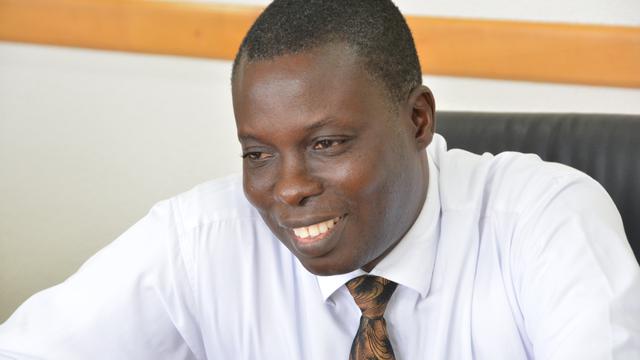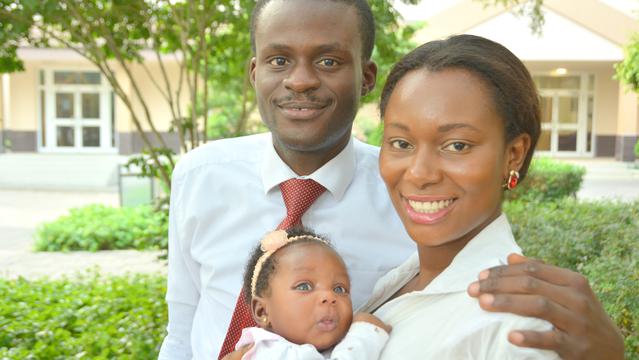Mormon Newsroom recently had an interview with Elder John Atta Koranteng, a seasoned international translator and interpreter, experienced educationist, respectable leader and member of The Church of Jesus Christ of Latter-day Saints.
Background History
Mormon Newsroom: Can you tell us about your family background and how you grew up?
Elder Koranteng: I am from Nkonya Akloba in the Volta Region of Ghana. I was born to Joseph Kwame Koranteng of blessed memory – a teacher who once served as the Jasikan District Commissioner during the Nkrumah administration – and Mercy Ababio who is still alive. I was born in quite a large family. My father’s children were twelve in all. I was born with a twin brother with whom I had my education up to the Masters [degree] level. And we had another set of male twins.
I was born in Hohoe in the Volta Region. I grew up a Catholic. After the February 1966 coup d’état, my father went to political detention. When he was released from detention, he returned to his professional teaching career in which he was [employed] before his political appointment.
I had my primary education for five years instead of six years for obvious reasons; had my middle school education for one year instead of four years and then had my normal five-year secondary school education. I went further to the Mount Mary Teacher Training College in Somanya. I proceeded to the University of Ghana, Legon, for my first degree in English, French, Swahili and linguistics. I later travelled to Norway for my Master of Philosophy (MPhil) degree.
I occasionally went to France, Togo, Burkina Faso and Cote d’Ivoire for a French language internship.
After my teacher-training education I taught French and English at the Jasikan Junior Secondary School (JSS), taught English and French at the Osei Tseretwie Senior Secondary School in Kumasi, and served as a Teaching Assistant (TA) at the University of Ghana, Legon after my first degree there.
Conversion and Life in the Church
Mormon Newsroom: How did you become a member of The Church of Jesus Christ of Latter-day Saints?
Elder Koranteng: In the course of my studies in Norway, I met missionaries of the Church. At a point during my discussions with them on their gospel message, I felt as though I had received the message before. So I felt like I had received enough of the truth because God himself confirmed it to me and I personally felt I had chanced on the truth and should not just leave it.
So in January 1996 when I returned to Ghana, I searched for the Church’s missionaries to refresh my memory on the teachings I received while in Norway. I was baptized into the Church on 6th April, 1996 in the then Madina Branch of the Church in Accra, which became a ward (a Latter-day Saint congregation) just two months after I joined the Church.
Soon after I was ordained as an elder in the priesthood (the power and authority of God delegated to men on earth), I was offered the opportunity to serve as the first counselor to the elders’ quorum president (one of two assistants to the leader of a men’s group in the Church).
After one-and-a-half years I was offered the duty to serve as the executive secretary of the Accra Ghana Christiansburg Stake (a group of Latter-day Saint congregations, similar to a diocese). I served as stake executive secretary under three different stake presidents.
In 2003 I became a counselor to the then newly called (appointed) Tema stake president. In June 2007, I became the stake president for Adenta. And on 6th April 2013, I was sustained (approved by the membership of the Church) as a member of the 3rd Quorum of the Seventy (a senior governing body of the Church).
Interestingly, at one point I had to double as stake president and member of the Seventy for two months. In March 2013, I was appointed as the Area Self Reliance Manager (for the West Africa Area).
| 1of5 | Elder John Attah Koranteng is interviewed by Mormon Newsroom© 2015 by Intellectual Reserve, Inc. All rights reserved. |
|
Impact of the Gospel
Mormon Newsroom: What has been the impact of the gospel in your life?
Elder Koranteng: The impact of the gospel has been tremendous in my life. I am particularly grateful to Heavenly Father that I met missionaries of the Church during my MPhil studies when I was taking courses like philosophy, reasoning and logic – and without the gospel one would have relied on his own abilities and thinking and thereby risk being wayward.
Challenges that Turned to Blessings
Mormon Newsroom: What are the challenges you faced in life that you saw as helpful in the end?
Elder Koranteng: I would say they were the more inspiring and edifying challenges because challenges are supposed to be edifying. The first I would like to talk about is the challenge in setting up one’s own business because no one gets so much involved except you yourself.
Particularly in our part of the world, there is hardly state support or cushioning for sole proprietorships, unlike what pertains in the developed world.
After our graduate studies at the university, my brother and I were out and about looking for a job, but to no avail. Our qualification (MPhil) alone ‘scared’ many job owners off because in their estimation, we were more for managerial posts. It was only when we applied our faith by fasting, praying and setting up our own computer software training service in my partitioned single room accommodation, that we began to make it. In our prayer to dedicate the business to God’s care, we prayed for a more suitable business accommodation within a period of two months, which truly came to pass.
The business went further to grow in leaps and bounds to its current successful and highly profitable state in our own landed proper (building). My brother and I started the business from a zero level. We just exercised faith as described by Amulek in Alma 32, in the Book of Mormon (considered by Latter-day Saints as companion scriptures to the Holy Bible, providing an account of Jesus Christ’s ministry to the people of ancient America).
The Power of Language and Growth of the Church in Ghana
Mormon Newsroom: How do you assess the growth of the Church in Ghana?
Elder Koranteng: The growth of the Church in Ghana has been one of acceleration. When I joined the Church there was only one stake in Ghana, today we have six stakes.
The translation of the Book of Mormon into Ghanaian dialects such as Twi, Ewe etc. has benefited so many people.
When I remember the first time I visited the Ivory Coast (Cote d’Ivoire) as a 17-year-old boy – and after 50 years, going back to that country in the company of General Authorities (senior leaders of the Church) – as a language interpreter I feel that God knew what he was preparing me for, by giving me the gift of languages.
Elder John Atta Koranteng has served in many leadership capacities. Presently, he is the Area Self-Reliance Manager for the Africa Southwest Area.
Elder Koranteng speaks seven languages fluently, including English, French, Norwegian, Swahili, Twi, Ewe and Nkonya. Before working for the Church, he and his twin brother Paul founded and managed an interpretation and translation services company. He and his wife Cynthia manage a basic school called Jakcint Academy, which they founded. They are the parents of two foster children.
SELF RELIANCE NOT JUST ABOUT MONEY AND MATERIAL POSSESSIONS
The Area Self Reliance Manager in the Africa West Area, for The Church of Jesus Christ of Latter-day Saints, Elder John Attah Koranteng, has stated that “the principle of self-reliance is a life of responsibility that is based on the exercise of faith through obedience to the commandments of God.”
He said there were many people in the world with huge material possessions but felt insecure and lived in fear.
Elder Koranteng was speaking in an interview with Mormon Newsroom in Accra.
According to him, self-reliance is not about having a lot of money and material possessions, but it is about learning and living what is termed “the doctrine of self-reliance.”
He explained that a careful study of the scriptures reveal instances where the Savior Jesus Christ intervened in the lives of many people “when they opened their hearts and minds and had faith in God and His son Jesus Christ.”
“I have over the years observed how people’s lives have transformed through obedience which leads to revelation of the mysteries of God,” he added.
He opined that self-reliance ensures true independence and freedom.
He pointed out that one of the most important ingredients of self-reliance was education which comprises both spiritual and temporal learning.
He said many people misunderstand the divine concept of self-reliance, hence their confusion in life.
“Self-reliance is about understanding one’s purpose in life. It is also about humans exercising righteous dominion over other creations of the earth and taking advantage of all the useful resources in universe, including ICT etc.,” he said.
To end, he referenced Doctrine and Covenants (a latter-day scripture of God’s revelations) Section 78, sub section 13 to 14 and
To see an additional published article about Elder John Attah Koranteng go to - http://www.deseretnews.com/article/865607508/Perpetual-Education-Fund-thriving-in-Ghana.html?pg=all

















































